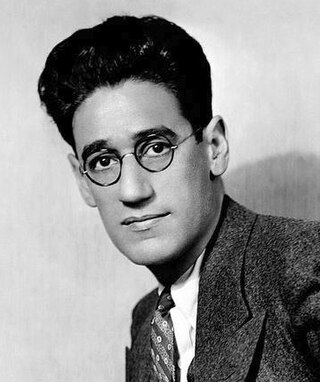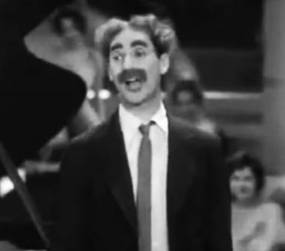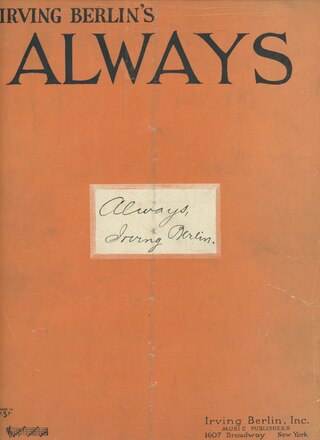
Julius Henry "Groucho" Marx was an American comedian, actor, writer, and singer who performed in films and vaudeville on television, radio, and the stage. He is considered one of America's greatest comedians.

George Simon Kaufman was an American playwright, theater director and producer, humorist, and drama critic. In addition to comedies and political satire, he wrote several musicals for the Marx Brothers and others. He won the Pulitzer Prize for Drama for the musical Of Thee I Sing in 1932, and won again in 1937 for the play You Can't Take It with You. He also won the Tony Award for Best Director in 1951 for the musical Guys and Dolls.

The Marx Brothers were an American family comedy act that was successful in vaudeville, on Broadway, and in 14 motion pictures from 1905 to 1949. Five of the Marx Brothers' fourteen feature films were selected by the American Film Institute (AFI) as among the top 100 comedy films, with two of them, Duck Soup (1933) and A Night at the Opera (1935), in the top fifteen. They are widely considered by critics, scholars and fans to be among the greatest and most influential comedians of the 20th century. The brothers were included in AFI's 100 Years...100 Stars list of the 25 greatest male stars of Classical Hollywood cinema, the only performers to be included collectively.

Animal Crackers is a 1930 American pre-Code Marx Brothers comedy film directed by Victor Heerman. The film stars the Marx Brothers,, with Lillian Roth and Margaret Dumont, based on the Marxes’ Broadway musical of the same name. Mayhem and zaniness ensue during a weekend party in honor of famed African explorer Captain Jeffrey T. Spaulding. A critical and commercial success upon its initial release, Animal Crackers was shot at Paramount's Astoria Studios in Astoria, Queens, the second film the Brothers would make in New York City.

Irving Berlin was an American composer and songwriter. His music forms a large part of the Great American Songbook. Berlin received numerous honors including an Academy Award, a Grammy Award, and a Tony Award. He also received the Presidential Medal of Freedom from President Gerald R. Ford in 1977. Broadcast journalist Walter Cronkite stated he "helped write the story of this country, capturing the best of who we are and the dreams that shape our lives".

Duck Soup is a 1933 American pre-Code musical black comedy film written by Bert Kalmar and Harry Ruby and directed by Leo McCarey. Released by Paramount Pictures on November 17, 1933, it stars the four Marx Brothers and also features Margaret Dumont, Louis Calhern, Raquel Torres and Edgar Kennedy. Duck Soup was the last of the five Marx Brothers films released by Paramount Pictures. In the film, Groucho portrays the newly installed president of the fictional country of Freedonia. Zeppo is his secretary, while Chico and Harpo are spies for the neighboring country of Sylvania. Relations between Firefly and the Sylvanian ambassador (Calhern) deteriorate during the film, eventually leading the two countries to war.

A Night at the Opera is a 1935 American comedy film starring the Marx Brothers, and featuring Kitty Carlisle, Allan Jones, Margaret Dumont, Sig Ruman, and Walter Woolf King. It was the first of five films the Marx Brothers made under contract for Metro-Goldwyn-Mayer after their departure from Paramount Pictures, and the first after Zeppo left the act. The film was written by George S. Kaufman and Morrie Ryskind from a story by James Kevin McGuinness, with additional uncredited dialogue by Al Boasberg. The film was directed by Sam Wood.

God Bless Tiny Tim is the debut studio album by American musician Tiny Tim, released in 1968 by Reprise. It contains a variety of contemporary and traditional pop standards, including his signature hit song "Tiptoe Through The Tulips", which was a Billboard Hot 100 top 20 hit single. God Bless Tiny Tim reached No. 7 on the US Billboard Top LPs chart during a 32-week run.

Leonard Joseph "Chico" Marx was an American comedian, actor and pianist. He was the oldest brother in the Marx Brothers comedy troupe, alongside his brothers Arthur ("Harpo"), Julius ("Groucho"), Milton ("Gummo") and Herbert ("Zeppo"). His persona in the act was that of a charming, uneducated but crafty con artist, seemingly of rural Italian origin, who wore shabby clothes and sported a curly-haired wig and Tyrolean hat. On screen, Chico is often in alliance with Harpo, usually as partners in crime, and is also frequently seen trying to con or outfox Groucho. Leonard was the oldest of the Marx Brothers to live past early childhood, the first-born being Manfred Marx who had died in infancy. In addition to his work as a performer, he played an important role in the management and development of the act in its early years.

Captain Jeffrey T. Spaulding is a fictional character in the Broadway musical Animal Crackers and the film of the same name. He was originally played by actor Groucho Marx, one of the Marx Brothers, in both productions. Despite his middle name being Edgar, he is known as Jeffrey T. Spaulding; his first name is also spelled as "Geoffrey" in parts of the film.
Harry Rubenstein, known professionally as Harry Ruby, was an American pianist, composer, songwriter and screenwriter, who was inducted into the Songwriters Hall of Fame in 1970. He was married to silent film actress Eileen Percy.

Monkey Business is a 1931 American pre-Code comedy film. It is the third of the Marx Brothers' released movies, and the first with an original screenplay rather than an adaptation of one of their Broadway shows. The film also features Thelma Todd, Harry Woods and Ruth Hall and Rockliffe Fellowes. It is directed by Norman Z. McLeod with screenplay by S. J. Perelman and Will B. Johnstone.

Blue Skies is a 1946 American musical comedy film directed by Stuart Heisler and starring Bing Crosby, Fred Astaire, and Joan Caulfield. Based on a story by Irving Berlin, the film is about a dancer who loves a showgirl who loves a compulsive nightclub-opener who can't stay committed to anything in life for very long. Produced by Sol C. Siegel, Blue Skies was filmed in Technicolor and released by Paramount Pictures. The music, lyrics, and story were written by Irving Berlin, with most of the songs recycled from earlier works.
"Anything You Can Do (I Can Do Better)" is a show tune composed by Irving Berlin for the 1946 Broadway musical Annie Get Your Gun. The song is a duet, with one male singer and one female singer attempting to outdo each other in increasingly complex tasks.

Morris "Morrie" Ryskind was an American dramatist, lyricist and writer of theatrical productions and movies who became a conservative political activist later in life.

"Always" is a popular song written by Irving Berlin in 1925, as a wedding gift for his wife Ellin Mackay, whom he married in 1926, and to whom he presented the substantial royalties.

Double Dynamite is a 1951 American musical comedy film directed by Irving Cummings and starring Jane Russell, Groucho Marx, and Frank Sinatra. The film was written by Leo Rosten (story), Melville Shavelson (screenplay), Mannie Manheim, and Harry Crane.
"Let's Face the Music and Dance" is a song published in 1936 by Irving Berlin for the film Follow the Fleet, where it was introduced by Fred Astaire and featured in a celebrated dance duet with Astaire and Ginger Rogers. The jazz song has also been covered by various artists years following its release, including Nat King Cole, Ella Fitzgerald, Frank Sinatra, Mel Torme, Todd Gordon and others.

The Cocoanuts is a musical with music and lyrics by Irving Berlin and a book by George S. Kaufman, with additional text by Morrie Ryskind.
Hal Borne was an American popular song composer, orchestra leader, music arranger and musical director, who studied music at the University of Illinois. He often collaborated with lyricists Sid Kuller and Ray Golden, including songs for the Marx Brothers and Tony Martin.
















